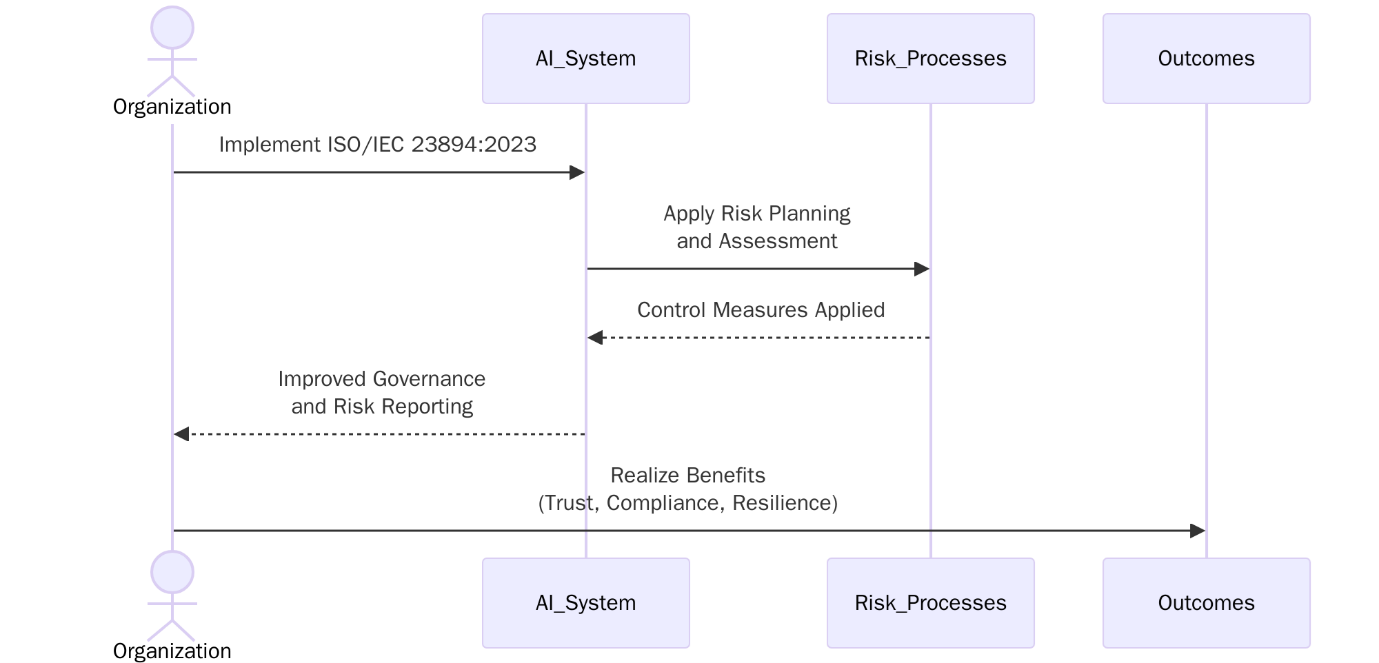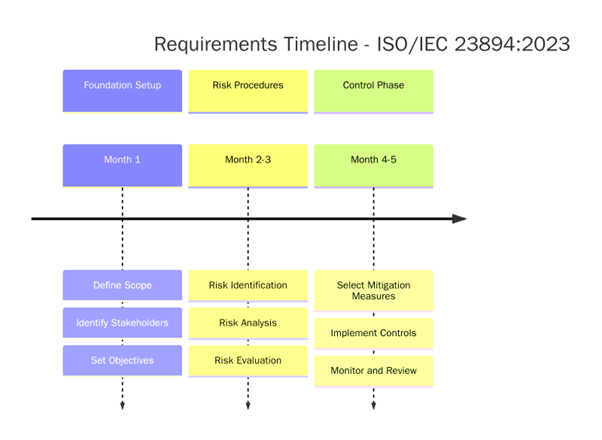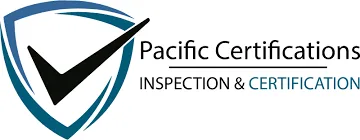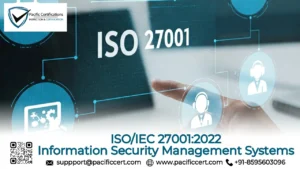What is ISO/IEC 23894:2023?
ISO/IEC 23894:2023 is the first dedicated international standard offering guidance on risk management specific to artificial intelligence (AI) systems. This standard complements existing risk management frameworks such as ISO 31000 by adapting principles to the unique challenges posed by AI technologies.

With AI playing a pivotal role in decision-making, automation, data analytics, and predictive systems, ISO/IEC 23894 helps organizations anticipate, evaluate, and control potential risks across the entire lifecycle of an AI system, from design and development to deployment and retirement. It also supports responsible innovation by balancing technological advancement with ethical, legal, and societal obligations.
To begin ISO/IEC 23894 implementation or certification, contact us at support@pacificcert.com.
Scope and Applicability
ISO/IEC 23894 is applicable to any organization that develops, deploys, operates, or maintains AI systems, includes:
- AI solution providers
- Technology integrators
- Data analytics companies
- Public institutions utilizing AI for public services
- Regulated sectors such as healthcare, finance, transportation, and defense
The standard provides non-prescriptive guidance for identifying and managing risks specific to AI systems, including algorithmic bias, data privacy issues, explainability challenges, unintended behavior, and cybersecurity vulnerabilities. It can be used as a standalone tool or integrated into existing enterprise risk management (ERM) frameworks.
What is ISO/IEC 23894:2023?
ISO/IEC 23053:2022, titled Framework for Artificial Intelligence (AI) Systems Using Machine Learning (ML), is an international standard developed by ISO/IEC JTC 1/SC 42. It establishes a comprehensive framework for describing generic AI systems that utilize machine learning technologies. The standard outlines system components and their functions within the AI ecosystem, providing a common terminology and set of concepts for such systems. It is applicable to organizations of all types and sizes, including public and private companies, government entities, and not-for-profit organizations implementing or using AI systems.
Certification Process and Procedure
- Conduct a gap analysis between your current AI-related practices and ISO/IEC 23894 guidelines
- Define the scope of AI systems to be covered by your risk management framework
- Identify internal and external stakeholders, including developers, data scientists, users, and regulators
- Develop or adapt a risk management policy addressing AI-specific concerns
- Establish risk identification, assessment, treatment, and monitoring procedures aligned with ISO 31000
- Integrate AI-specific controls such as model validation, fairness audits, and explainability evaluations
- Document all risk-related decisions, performance indicators, and treatment plans
- Undergo a third-party audit through an accredited body such as Pacific Certifications
Begin your ISO/IEC 23894 risk management integration with us, contact us at support@pacificcert.com.
Documentation Required
Organizations implementing ISO/IEC 23894 should prepare and maintain:
- AI risk management policy and objectives
- Risk registers identifying specific AI-related risks
- Framework for risk assessment and criteria for risk prioritization
- Evidence of stakeholder consultation and ethical reviews
- Risk treatment plans for high-priority risks
- Records of model testing, validation, and explainability analysis
- Data governance logs, privacy impact assessments, and cybersecurity controls
- Monitoring reports, audit logs, and corrective action documents
We provide end-to-end documentation support, contact support@pacificcert.com.
Eligibility Criteria
Any organization designing or using AI systems, whether in-house or through third-party providers, is eligible to adopt ISO/IEC 23894. Criteria include:
- Having operational control or influence over AI technologies
- An established or developing AI governance or risk management team
- A commitment to ethical, secure, and human-centric AI principles
Applicable to both small startups and large enterprises, ISO/IEC 23894 is scalable and adaptable.
Certification Costs
The cost of implementing ISO/IEC 23894 will vary based on:
- Number and complexity of AI systems in use
- Organizational size and industry
- Existing maturity of risk management processes
- Level of integration with standards such as ISO 27001 or ISO 31000
Get a custom quote, contact us at support@pacificcert.com.
Certification Timeline
- Initial Gap Analysis: 2–3 weeks
- Risk Policy and Framework Development: 3–4 weeks
- System Integration and Testing: 3–5 weeks
- Documentation Finalization and Internal Audit: 2 weeks
- Final Certification Audit: 1–2 weeks
Typical duration: 10–14 weeks, depending on organizational readiness and AI system complexity.
What are the Requirements of ISO/IEC 23894:2023?
ISO/IEC 23894 aligns with ISO 31000 but offers AI-specific considerations for:

- Principles of Risk Management: AI risks must be evaluated with transparency, fairness, and inclusiveness in mind
- Organizational Framework: Management commitment, accountability structures, and resources must be assigned
- Risk Identification and Analysis: Factors include data bias, black-box models, ethical implications, adversarial attacks, and unintended behaviors
- Monitoring and Reporting: Real-time analytics, audit trails, and incident detection systems are essential for dynamic AI environments
- Treatment Strategies: Can include algorithm re-design, data filtering, human-in-the-loop mechanisms, or AI deactivation thresholds
The standard encourages a lifecycle perspective, planning for risk at every stage of an AI system, from data collection and model training to user deployment and retirement.
What are the Benefits of ISO/IEC 23894 Implementation?
- Supports ethical and responsible use of AI technologies
- Increases trust among regulators, clients, users, and the public
- Enhances resilience against AI-related threats and failures
- Reduces reputational, financial, and legal risks
- Strengthens alignment with data protection laws (e.g., GDPR, AI Act)
- Facilitates smoother integration of AI into business and public services

With governments and industries racing to regulate AI, ISO/IEC 23894 is quickly becoming a cornerstone of responsible AI development. The standard helps address demands from global regulators, ESG frameworks, and AI ethics boards. Adoption is especially relevant for sectors integrating AI into safety-critical or high-impact domains such as healthcare, finance, transportation, and law enforcement.
The European Union’s AI Act, U.S. Executive Orders on AI, and OECD AI Principles all highlight the need for transparent and accountable risk management frameworks. ISO/IEC 23894 offers a globally recognized pathway to fulfill these expectations.
How Pacific Certifications Can Help?
Pacific Certifications supports your journey toward safe, responsible, and standard-aligned AI deployment. We provide tailored guidance to implement ISO/IEC 23894 and integrate it with your broader cybersecurity and risk governance systems.
Our services include:
- AI risk readiness assessments
- Policy design and stakeholder engagement templates
- AI model governance and testing protocols
- Documentation, gap audits, and internal review support
- Final certification audits and ongoing surveillance
Secure your AI systems with confidence, for our support, contact us at support@pacificcert.com.
Frequently Asked Questions (FAQs)
Is ISO/IEC 23894 mandatory?
No, but it supports compliance with emerging AI regulations and demonstrates proactive governance.
Can it be applied to machine learning models and generative AI?
Yes, the standard covers all types of AI, including ML and GenAI systems.
Does it require integration with ISO 31000?
No, but ISO 23894 builds upon and aligns closely with ISO 31000 principles.
What are the benefits for startups?
Faster trust-building, risk clarity, easier investor due diligence, and long-term scalability.
How long is certification valid?
Usually valid for 3 years with annual surveillance audits.
Contact Us
If you need support with ISO/IEC 23894:2023 certification, contact us at support@pacificcert.com.
Read More at: Blogs by Pacific Certifications






